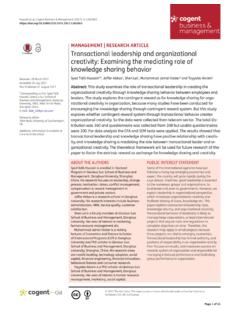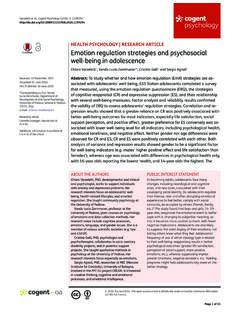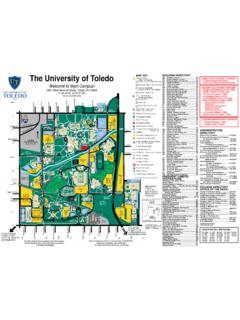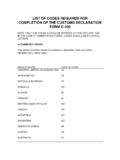Transcription of Analysis of the moderating effect of entrepreneurial ...
1 Hern ndez-Perlines & Ibarra Cisneros, Cogent Business & Management (2017), 4: 1408209 , CORPORATE GOVERNANCE & BUSINESS ETHICS | RESEARCH ARTICLEA nalysis of the moderating effect of entrepreneurial orientation on the influence of social responsibility on the performance of Mexican family companiesFelipe Hern ndez-Perlines1* and Manuel Alejandro Ibarra Cisneros2 Abstract: This study analyzes the entrepreneurial orientation s moderating effect on the influence of social responsibility on the performance of family companies in Mexico. To analyze the results, we propose the utilization of a method of second-generation structural equations (PLS-SEM) using SmartPLS statistical software applied to data from 140 Mexican family businesses. The first important contribution of this work is that the Analysis of corporate social responsibility via the elaboration of GRI memories is adequate, as the proposed measurements are reliable and valid.
2 The second contribution is that in Mexican family businesses social responsibility actions also become outcome improvements, accomplishing substantial influence. Finally, the third contribution of this work is that entrepreneurial orientation reveals as a positive moderator on the effect of social responsibility on the performance of family businesses.*Corresponding author: Felipe Hern ndez-Perlines, Department of Business Administration, University of Castilla-La Mancha, San Pedro M rtir, s/n, 45071 Toledo, Spain E-mail: editor:Collins G. Ntim, University of Southampton, UKAdditional information is available at the end of the articleABOUT THE AUTHORSF elipe Hern ndez-Perlines holds a PhD in Economics and Business from the University of Castilla-La Mancha. He is a professor in strategic management and human resources in the Department of Business Administration. He has been a visiting professor at several universities in Italy, France, Mexico, Portugal, and the United States.
3 His research focuses mainly on the strategic direction of human resources, strategic alliances, entrepreneurship orientation, and social responsibility, which have been published in journals such as Journal Business Research, R & D Management, Journal of Promotion Management, European Journal of International Management, Sustainability, Psychology and Marketing, Frontiers in Alejandro Ibarra Cisneros holds a PhD in Economics and Businesses from the Univerisidad de Castilla-La Mancha. He is currently a professor at the Faculty of Administrative Sciences of the Autonomous University of Baja California (Mexico). He has written several researches on human resources management, international business, and ICT. Likewise, he is the author of several books on improving the management of the INTEREST STATEMENTC orporate Social Responsibility and entrepreneurial Orientation are revealed as two key elements for the performance of family businesses.
4 This is clear from the study conducted in family businesses in Mexico. Family businesses that develop social responsibility activities can improve their performance substantially (the CSR is able to explain of the variance of performance of family businesses). If, in addition, we consider the EO and the CSR, the influence on performance increases to This result shows the positive moderating role of EO on the effect of CSR on the performance of family businesses. Of the dimensions that have been considered to define CSR and EO, environmental dimension and innovation are those that have the greatest influence on the performance of family businesses. These results suggest that the CSR and the EO should be an important part of the design of the strategies of family businesses, especially green : 28 September 2017 Accepted: 18 November 2017 First Published: 23 November 2017 2017 The Author(s). This open access article is distributed under a Creative Commons Attribution (CC-BY) 1 of 17 Page 2 of 17 Hern ndez-Perlines & Ibarra Cisneros, Cogent Business & Management (2017), 4: 1408209 : Environmental Economics; Strategic Management; Corporate Social Responsibility & Business Ethics; Entrepreneurship and Small Business ManagementKeywords: social responsibility; entrepreneurial orientation; enterprise performance; family business; moderating effect ; PLS1.
5 IntroductionIn recent years, corporate social responsibility (CSR), entrepreneurial orientation (EO), and how to improve the performance of family businesses continue to focus academic and business interest, both in Mexico and in other developed and emerging countries. In this paper, we try to answer the previous concerns trying to verify the moderating effect of the EO in the influence of CSR in the per-formance of family businesses in CSR has become an unavoidable priority for companies and executives (Lu, Chau, Wang, & Pan, 2014) and owing to its capacity to produce shared value (Porter & Kramer, 2011), it is placed at the core of the companies productive activities. Although the Analysis of CSR appeared early in the XX century (Barnard, 1938; Kreps, 1962), it was not until the 1980s when it came into vogue with the appearance of the Stakeholder theory (Freeman, 1984). The revision of literature demonstrates the disparity of results in the Analysis of CSR in the performance of companies: positive relation, negative relation, or neutral relation (Margolis & Walsh, 2003; Orlitzky, Schmidt, & Rynes, 2003; Van Beurden and G ssling, 2008; Wu, 2006).
6 In line with the above, derived from the fact that the Analysis of the influence of CSR continues to be a non-conclusive line of research, one of the objectives of this paper is to analyze social responsibility in the performance of family businesses in the other hand, we are witnessing the proliferation of numerous studies that analyze EO, as it is an emerging research field (Covin & Miller, 2014; Hern ndez-Perlines, 2016; Kropp, Lindsay, & Shoham, 2006). Some of these studies reveal the existence of a positive relation between EO and outcomes (Barringer & Bluedorn, 1999; Covin & Slevin, 1989; Miller, 1983; Wiklund & Shepherd, 2005: Zahra, 1991; Zahra & Covin, 1995; ); this way, EO is a valuable predictor of entrepreneurial success (Kraus, Rigtering, Hughes, & Hosman, 2012).This work is justified because even though we acknowledge CSR can be considered a source of competitive advantage for companies (Alvarado-Herrera, Bign -Alca iz, & Curr s-P rez, 2011), thus positively influencing the outcomes (Garcia-Castro, Ari o, & Canela, 2010; Hern ndez-Perlines & S nchez-Infantes, 2016: Miras-Rodr guez, Carrasco-Gallego, & Escobar-P rez, 2015;), there exist some behaviors or processes in the companies that act as moderators of such relation.
7 The theoreti-cal framework we use to analyze the relationship between CSR is that proposed by Preston and O bannon (1997). These authors consider the neutral approach, which allows to consider the mod-eration of certain variables, internal and external. In our case, we analyzed the moderating effect of EO in similar terms to what it has been in other studies (Li, Zhao, Tan, & Liu, 2008; Richard, Barnett, Dwyer, & Chadwick, 2004; Wales, Parida, & Patel, 2013). In this sense, the main objective of this work is to analyze the moderating effect of the EO on the influence of the CSR on the performance of fam-ily businesses in Mexico. Two others derive from this main objective; On one hand, analyze the influ-ence of the CSR on the performance of family businesses in Mexico; and, on the other hand, to analyze the influence of EO on the performance of family businesses in Mexico. The main contribu-tion of this work is the Analysis of the moderating effect of the EO on the influence of the CSR on the performance of family businesses in Mexico, being, in this sense, a pioneering companies under study are family businesses located in Mexico.
8 The justification of this elec-tion is the importance of these companies, which represent 99% of the total existing companies, with an average of employees by company (INEGI, 2015). Thereby, we can state that this sort of companies is an important drive for economic growth and welfare, in general, and for Mexico in particular (Astrachan & Shanker, 2003).Page 3 of 17 Hern ndez-Perlines & Ibarra Cisneros, Cogent Business & Management (2017), 4: 1408209 analyze data, in this work we propose to utilize a PLS-SEM structural equation model, through computer software SmartPLS (Ringle, Wende, & Becker, 2015). Data on EO were obtained by means of a questionnaire sent via email to the CEO s of family businesses out of a sample of 900 companies listed in a directory published by the National Institute of Statistics and Geography (INEGI, 2015). Data on the companies social responsibility were taken from sustainability memories.
9 After this process, which lasted from November 2015 to February 2016, valid information from 140 family businesses was work structures in such manner that after this introduction, in Section 2 the main theoretical aspects of CSR and EO are analyzed and the different hypotheses intended to contrast are present-ed. In Section 3, the research design is shown, including the model s approach, data gathering, the variables measurement and the method to analyze the hypotheses. In Section 4, the main results of the performed Analysis are presented. Finally, in Section 5, the most relevant conclusions as well as the main limitations of the study are offered and future research lines are also Theory and Corporate social responsibilityThere is no doubt that companies should think about how to be competitive in an increasingly larger market and subject to major changes. Therefore, it is necessary to analyze what factors affect their results, to support those that positively influence and reduce the effect of negative ones.
10 In this sense, the social responsibility of the company has become an unavoidable priority for companies and their managers (Lu et al., 2014). Although the Analysis of the company s social responsibility emerged at the beginning of the twentieth century, we can affirm that CSR has been placed at the core of the activity of companies because of their ability to create shared value, since not only it creates value for the company, but also creates value for society (Porter & Kramer, 2011).From the review of the literature on CSR we find works that highlight the divergence in the influ-ence of CSR on its performance (Lu et al., 2014; Margolis & Walsh, 2003; Orlitzky et al., 2003; Wu, 2006). Therefore, some authors suggest continuing to analyze the relationship between CSR and its influence on the performance of companies (Miras et al., 2015). The theoretical approach that sus-tains this research is that proposed by Preston and O Bannon (1997), which considers various pos-sibilities to analyze the influence of the CSR on the performance of the the multiple definitions of CSR, in this work we have used the one that links this concept with the presentation of sustainability reports, in order to inform the different interest groups and society in general, the actions on economic issues, social and environmental issues that the company is car-rying out (Campopiano & De Massis, 2015; Castej n & L pez, 2016; Chen, Feldmann, & Tang, 2015; Gamerschlag, M ller, & Verbeeten, 2011).












